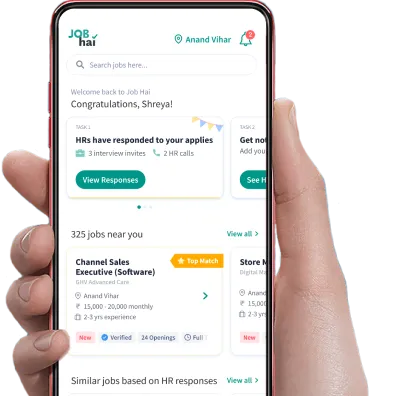Maruti Nandan Manpower Business Solution
Jagatpura, Jaipur
Graduate
Skills: MS Excel, Convincing Skills, Computer Knowledge, Cold Calling, Lead Generation
Wua
Jagatpura, Jaipur
Graduate
Skills: Lead Generation, Convincing Skills, Cold Calling, Computer Knowledge, MS Excel
Bl Realty And Marketing Consultants
Jagatpura, Jaipur
Graduate
Skills: Lead Generation, Cold Calling, Computer Knowledge, Convincing Skills

₹20,000 - ₹35,000 /Month *
Da Afk Ventures
Jagatpura, Jaipur
Incentives included
7 Openings
0 - 3 years Experience in Sales / Business Development
Wua
Jagatpura, Jaipur
Graduate
Skills: MS Excel, Computer Knowledge, Cold Calling, Convincing Skills
Da Afk Ventures
Jagatpura, Jaipur
Graduate
2 - 6 years Experience in Sales / Business Development

₹8,000 - ₹35,000 /Month *
Aimarketing24
Jagatpura, Jaipur
Graduate
Incentives included
6 Openings
Skills: Computer Knowledge, Lead Generation, Cold Calling, MS Excel, Convincing Skills

₹15,000 - ₹25,000 /Month *
Maurya Competition Classes
Jagatpura, Jaipur
Graduate
Incentives included
1 Opening
Skills: Lead Generation, Convincing Skills, Cold Calling
Tirupati Software Infotech
Jagatpura, Jaipur
Skills: MS Excel, Convincing Skills, Cold Calling, Computer Knowledge, Lead Generation

₹14,000 - ₹25,000 /Month *
Marutinandan Manpower Business Solution
Jagatpura, Jaipur
Incentives included
35 Openings
Skills: Cold Calling, Lead Generation, Convincing Skills
My Pixel Panda
Jagatpura, Jaipur
Graduate
Skills: MS Excel, Cold Calling, Computer Knowledge
Ica Edu Skills
Jagatpura, Jaipur
Graduate
Skills: Convincing Skills, Cold Calling, Lead Generation
How much experience do you have?

₹10,000 - ₹20,000 /Month *
E57 Healthcare
Jagatpura, Jaipur
Graduate
Incentives included
1 Opening
Skills: Convincing Skills, Lead Generation, MS Excel, Computer Knowledge
Maruti Nandan Manpower Business Solution
Jagatpura, Jaipur
Skills: Cold Calling, Lead Generation, Convincing Skills, MS Excel, Computer Knowledge
Triptoll Inventures
Jagatpura, Jaipur
Skills: Computer Knowledge, Cold Calling, Convincing Skills, Lead Generation, MS Excel
Sales / Business Development Jobs by Popular Localities around Jagatpura
Creanovation Technologies
Jagatpura, Jaipur
Skills: Convincing Skills, Cold Calling
Similar Job Openings almost matching your search
Rr Technology Private Limited
Vipra Vihar, Jaipur(Field job)
1 - 3 years Experience in Sales / Business Development
Parthasarathi
Malviya Nagar, Jaipur
Graduate
Freshers in Sales / Business Development
The Brand Creation
Vidhyadhar Nagar, Jagatpura, Jaipur
6 - 24 months Experience in Sales / Business Development
₹12,000 - ₹22,000 /Month *
Automotive Creative Solution
Malviya Nagar Industrial Area, Jaipur
Below 10th
Incentives included
5 Openings
0 - 2 years Experience in Sales / Business Development
